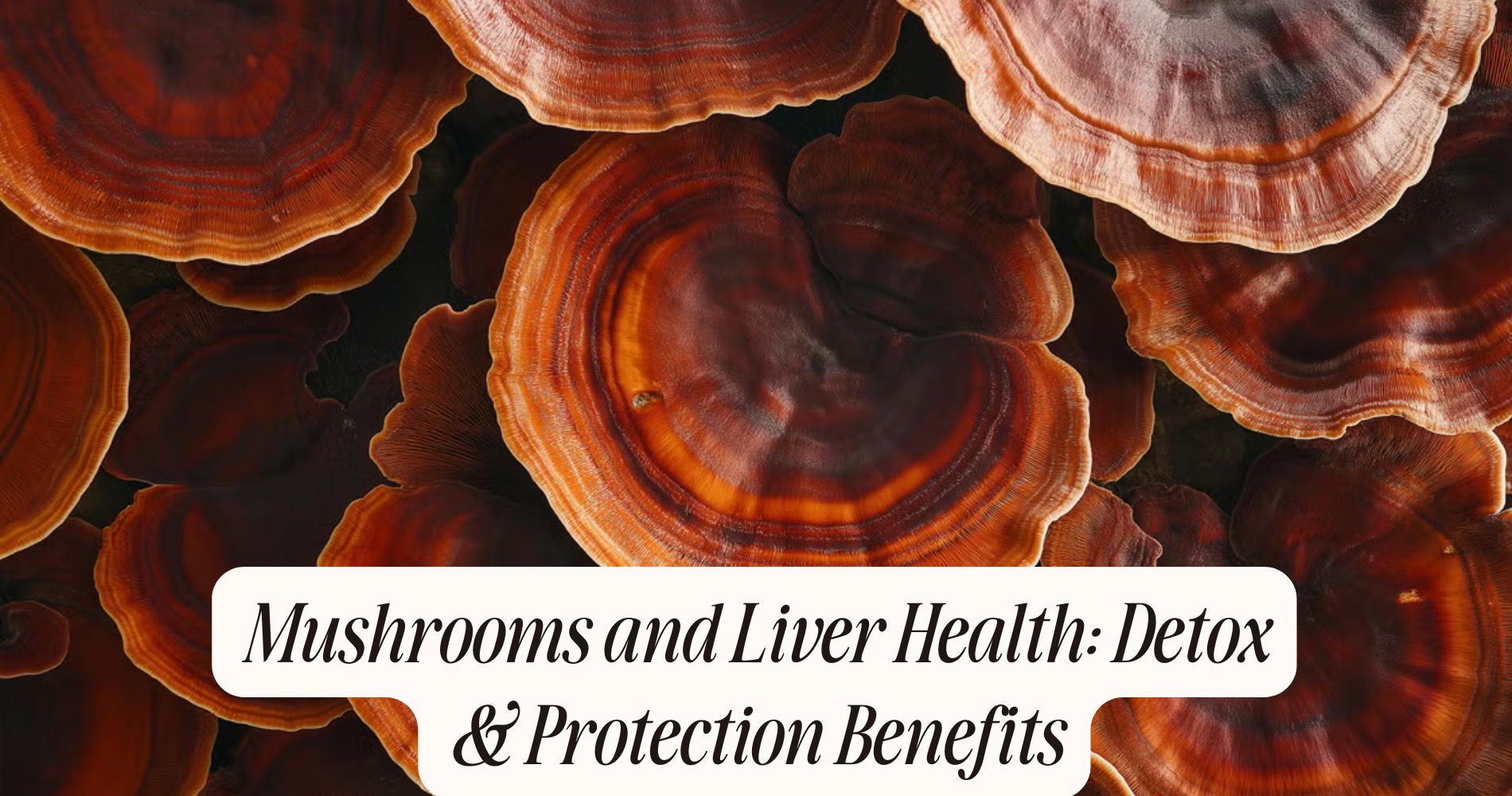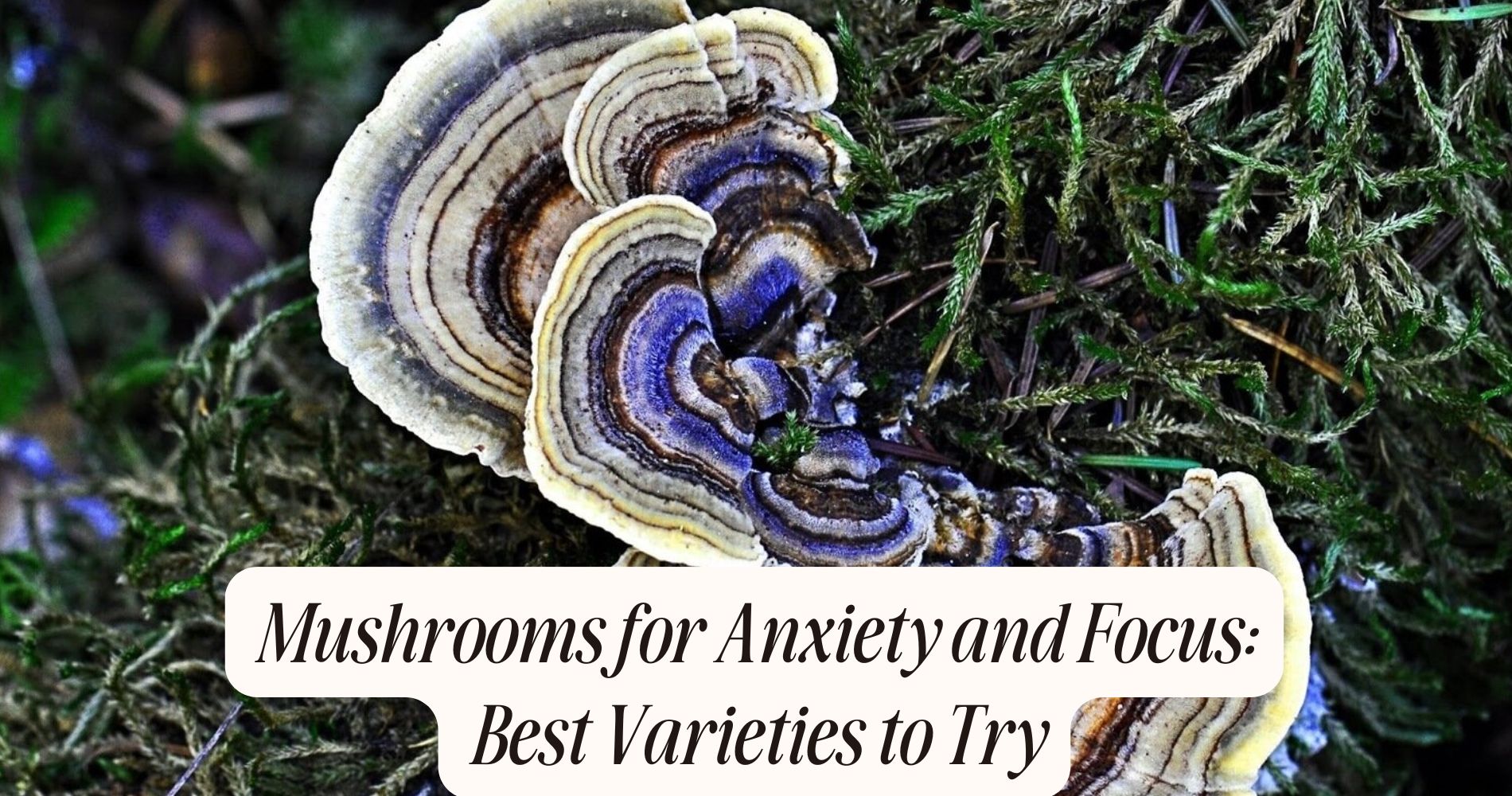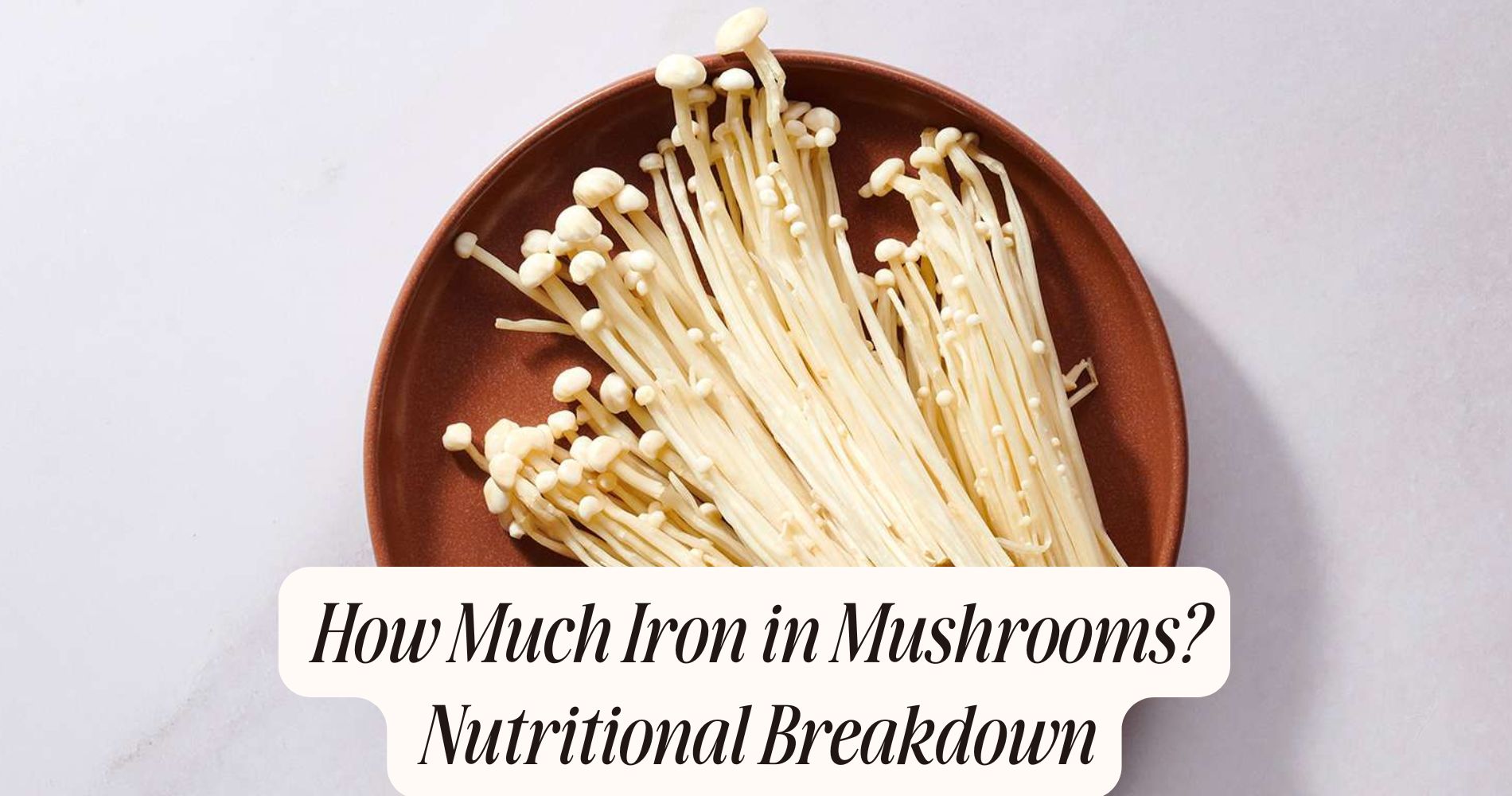
Mushrooms and Liver Health: Detox & Protection Benefits
Mushrooms and liver health go hand in hand, thanks to their powerful detoxifying and protective compounds. Rich in beta-glucans and ergothioneine, mushrooms help stimulate liver enzyme activity and safeguard liver cells from damage. Their antioxidant content helps neutralize harmful free radicals, reducing oxidative stress that can impair liver function. Varieties like Shiitake and Reishi are especially effective in promoting liver detoxification and easing inflammation. Discover how incorporating mushrooms into your daily routine can naturally support liver health and enhance overall wellness.
The Role of the Liver in Detoxification
When you consider the body's detoxification processes, the liver plays a fundamental role in maintaining overall health. It serves as a central hub for detox mechanisms, filtering toxins from your bloodstream.
The liver functions by converting harmful substances into less toxic compounds, which are then excreted through bile or urine. This organ also metabolizes drugs, breaking them down into forms that are easier for your body to eliminate.
Additionally, the liver's ability to store essential nutrients supports its detox capabilities. It produces vital proteins involved in blood clotting and other functions.
Key Compounds in Mushrooms That Benefit the Liver
Although often overlooked, mushrooms contain key compounds that can greatly benefit liver health. Polysaccharides, particularly beta-glucans found in mushrooms, play a vital role in supporting liver function. They interact with liver enzymes, enhancing their activity and improving the organ's ability to process toxins efficiently.
Another compound, ergothioneine, acts as a cellular protectant, helping to preserve liver cell integrity against potential damage.
Moreover, mushrooms like Reishi and Shiitake are rich in triterpenoids, known for their anti-inflammatory properties, aiding in reducing liver inflammation. These mushroom compounds contribute to maintaining ideal liver enzyme levels, ensuring your liver can perform its detoxification and metabolic functions effectively.

Integrating these mushrooms into your diet could support liver health and enhance its resilience against various stressors.
Antioxidant Properties of Mushrooms
Mushrooms not only offer compounds that support liver function but also boast impressive antioxidant properties, essential for maintaining overall liver health.
You might wonder what gives mushrooms these protective abilities. It's largely due to their rich content of mushroom polyphenols, which are powerful antioxidants.
These polyphenols help neutralize free radicals, reducing oxidative stress in the liver. Oxidative stress is a key player in liver damage and diseases.
By understanding the antioxidant mechanisms involved, you can see how mushrooms serve as a natural ally in liver protection.
Scientific studies highlight that consuming mushrooms regularly can enhance your body's antioxidant defenses.
Integrating mushrooms into your diet could be a simple yet effective strategy to bolster liver health and prevent oxidative damage.
Polysaccharides and Their Impact on Liver Health
While exploring the health benefits of mushrooms, it's essential to understand the role of polysaccharides in supporting liver health. These unique compounds, characterized by their complex polysaccharide structure, play a significant role in immune modulation.
When you consume mushrooms, their polysaccharides interact with your immune system, enhancing its ability to protect the liver from toxins and inflammation. Scientific studies have demonstrated that these structures can stimulate immune responses, thereby promoting a healthier liver environment.
Research indicates that polysaccharides in mushrooms can help in reducing liver damage by modulating immune cells like macrophages and natural killer cells.
Specific Mushroom Varieties for Liver Support
Understanding the role of polysaccharides in supporting liver health sets the stage for exploring specific mushroom varieties that are particularly beneficial.
Shiitake mushrooms stand out with their potent benefits. They contain lentinan, a polysaccharide that supports liver function by promoting detoxification and boosting immune response. Lentinan helps the liver process and eliminate toxins more efficiently, contributing to overall health.

Reishi mushrooms are equally impressive, known for their protective effects on the liver. They contain triterpenoids, compounds that reduce inflammation and oxidative stress, protecting liver cells from damage.
Reishi's effects also include enhancing liver regeneration, making it a valuable ally in maintaining liver health. Incorporating these mushrooms into your diet can provide substantial support for your liver's detoxification and protection processes.
Scientific Studies on Mushrooms and Liver Function
As scientific inquiry into the health benefits of mushrooms expands, studies consistently reveal their positive impact on liver function.
Researchers have found that certain mushrooms, such as reishi and shiitake, contain compounds that can modulate liver enzymes, essential for detoxification processes.
Mushroom extraction techniques isolate these beneficial compounds, enhancing their bioavailability and effectiveness.
In clinical studies, mushroom extracts have shown the potential to lower elevated liver enzyme levels, indicating improved liver health.
Animal studies also suggest that these extracts protect against liver damage caused by toxins.
By supporting antioxidant activity and reducing inflammation, mushrooms help maintain liver integrity.
These findings underscore the importance of further research into mushroom extraction and its role in promoting liver health.
How to Incorporate Mushrooms Into Your Diet
Incorporating mushrooms into your diet can be both enjoyable and beneficial for your liver health. To start, explore mushroom recipes that highlight their unique nutritional benefits, like high antioxidants and anti-inflammatory properties.
Use diverse cooking methods such as sautéing, grilling, or roasting to enhance their flavor. For effective dietary integration, consider meal planning to include mushrooms in soups, salads, or stir-fries.
Experiment with flavor pairing, such as combining mushrooms with garlic or thyme, to elevate your dishes. Snack options like mushroom jerky or baked mushroom chips offer convenient alternatives.
Potential Risks and Considerations
While mushrooms offer numerous health benefits, it's important to be aware of potential risks and considerations when adding them to your diet.
Mushroom toxicity is a considerable concern, as not all mushrooms are safe for consumption. Some wild mushrooms contain toxins that can lead to severe liver damage or even be fatal. To mitigate this risk, stick to purchasing mushrooms from reliable sources.
Additionally, consider the possibility of allergic reactions. Though rare, some individuals may experience symptoms such as skin rashes, headaches, or gastrointestinal distress when consuming certain mushroom varieties.
It's advisable to introduce mushrooms gradually into your diet and monitor for any adverse reactions. Consulting a healthcare professional before markedly increasing your mushroom intake can help safeguard your liver health.
Comparing Mushrooms to Traditional Liver Supplements
When evaluating the benefits of mushrooms versus traditional liver supplements, it's crucial to take into account their differing mechanisms of action and nutrient profiles.
Mushroom extracts, such as those from reishi or shiitake, contain bioactive compounds known to support liver health by modulating liver enzymes and reducing oxidative stress. These natural extracts can enhance liver function without the side effects often associated with synthetic supplements.
Traditional liver supplements, like milk thistle, primarily focus on silymarin, known for protecting liver cells and supporting detoxification.
While both options aim to promote liver health, mushrooms offer a broader spectrum of nutrients and bioactive compounds. Choosing between them depends on your health goals and how each fits into your overall wellness plan.
Future Research Directions in Mushroom Liver Health
As research into mushrooms and liver health continues to expand, scientists are focusing on several promising avenues that could deepen our understanding and application of these natural remedies.
You're likely to see studies examining specific mushroom extracts and their effects on liver enzymes. Understanding which extracts are most effective could lead to targeted therapies for liver conditions.

Researchers are also exploring how these extracts interact with drugs metabolized by the liver, aiming to optimize therapeutic benefits while minimizing adverse effects.
Future studies might also investigate the molecular pathways through which mushrooms exert their hepatoprotective effects. By pinpointing these mechanisms, you'll better grasp how mushrooms can be integrated into liver health strategies, offering both detoxification and protection benefits.
Daily Detox, Made Delicious
Looking to support your liver and overall wellness without complicated routines? Try SUPER MUSHROOM GUMMIES by Well Gummies — a convenient, chewable way to harness the power of 10 functional mushrooms. These vegan gummies are designed to fuel your brain, enhance focus, and promote immune balance while supporting natural detoxification. With a burst of wild berry flavor and none of the jitters or crashes, they’re as enjoyable as your favorite candy. Add them to your daily routine and feel the difference from the inside out.
Frequently Asked Questions
Can Mushrooms Be Used in Homemade Liver Cleanse Recipes?
You can include mushroom varieties like reishi and shiitake in homemade liver cleanse recipes. They support liver detoxification due to their bioactive compounds, which enhance liver function, promote detox processes, and offer antioxidant protection, based on current research.
How Do Mushrooms Affect Liver Enzymes During Illness?
When you're sick, specific mushroom compounds might help stabilize liver enzymes, thereby supporting liver function. These compounds can enhance detoxification and reduce oxidative stress, promoting overall liver health. Always consult with a healthcare professional before using mushrooms therapeutically.
Are There Any Mushroom Allergies That Impact Liver Health?
You might experience mushroom allergy symptoms like skin rashes, respiratory issues, or digestive problems. While not directly impacting liver health, severe reactions could cause stress on your liver, highlighting the importance of monitoring symptoms closely.
Do Cooking Methods Alter Mushrooms' Liver Health Benefits?
Yes, cooking techniques can impact mushrooms' liver health benefits. Some methods, like boiling, might reduce nutrient retention, while others, such as steaming or sautéing, typically preserve more nutrients, supporting your liver's detoxification and protection functions better.
What Is the Cultural History of Using Mushrooms for Liver Health?
You explore the cultural history of mushrooms and discover they've been integral in traditional practices for liver health. Ancient civilizations recognized their medicinal uses, relying on them as natural remedies supported by emerging scientific evidence of their benefits.
Conclusion
Incorporating mushrooms into your diet can offer significant liver health benefits, thanks to their antioxidant properties and beneficial polysaccharides. Specific varieties, like reishi and shiitake, provide targeted liver support, potentially outperforming traditional supplements. However, it's essential to evaluate potential risks and consult a healthcare professional before making changes. As research evolves, mushrooms may play an even more integral role in liver health strategies, offering a natural, effective means of detoxification and protection for your liver.




